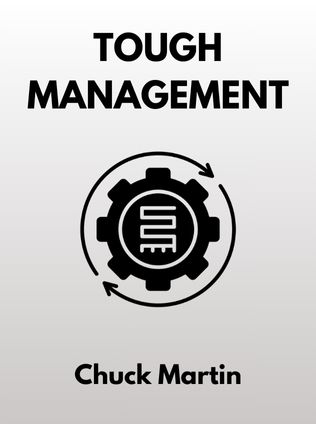
Tough Management
The 7 Ways to Make Tough Decisions Easier, Deliver the Numbers, and Grow Business in Good Times and Bad
By Chuck Martin
Published 05/2005
About the Author
Chuck Martin is a bestselling author and an internationally recognized business strategist. As chairman and CEO of NFI Research, he operates a global idea exchange and research engine with a network base of over 2,000 executives and managers from more than 1,000 companies in over 50 countries, including half of the Fortune 100. Martin’s extensive background in business strategy and his hands-on experience with high-level executives make him an authority in the field of management. His insights and research are grounded in real-world data, providing actionable strategies for today’s demanding business environment.
Main Idea
In today’s high-pressure business world, traditional management paradigms are no longer effective. Faced with shrinking budgets, smaller staffs, shorter deadlines, and more demanding customers, executives and managers need a fresh, bottom-line approach to tackle tough decisions and achieve sustained growth. TOUGH MANAGEMENT by Chuck Martin offers practical, powerful, and proven techniques to help managers make tough decisions, focus on results, and communicate effectively while remaining flexible. The book is based on more than two years of surveys involving over 2,000 senior executives and managers, providing real solutions to real problems in the real world.
Table of Contents
- TOUGH MANAGEMENT
- The Seven Rules of Tough Management
- Communicate Clearly
- Force the Hard Decisions
- Focus on Results
- Remain Flexible
- Prove Your Value to the Company
- Force Collaboration
- Tough Management Without Being a Tough Guy
TOUGH MANAGEMENT
Work today is more demanding than ever before. The bottom-line orientation required for budget-constrained organizations is the new reality. The need for improved output has increased without a proportionate increase in personnel, driving shareholders, executives, and managers to demand more from their employees and themselves. The mantra of today's work environment is clear: do more with less. This burden affects everyone, from top-level executives to entry-level employees, and tough management is the solution to navigate this challenging landscape.
The Seven Rules of Tough Management
The foundation of tough management consists of seven rules designed to help overworked managers make tough decisions more easily and grow the business:
- Communicate Clearly
- Force the Hard Decisions
- Focus on Results
- Remain Flexible
- Prove Your Value to the Company
- Force Collaboration
- Practice Tough Management Without Being a Tough Guy
Communicate Clearly
Communication is king in business. Tough management requires an obsessive attention to the effectiveness of all communication, including the what, when, how, and most importantly, the why of what you are communicating. Clear communication aligns those creating strategy with those executing it. Joe Puglisi, CIO of EMCOR Group, emphasizes the importance of accessibility in communication:
"People can get to me easily and I make sure I can get to my people whenever I need to." - Chuck Martin
This approach ensures that everyone who needs to hear the message does, in fact, receive it in a timely fashion. Tough management also requires more listening to determine what was heard compared to what was said. This clarity bridges the gap between corporate strategy and day-to-day execution, reducing frustration and increasing alignment.
Effective communication in tough management is not just about delivering messages but also about ensuring that those messages are understood. This involves constant and bi-directional communication. For example, at EMCOR Group, Peter Baker, the Director of Applications, maintains constant communication with his boss and peers, ensuring a free flow of information that facilitates quick decision-making. This cultural decision to allow open communication prevents the hoarding of information and ensures everyone is on the same page, reducing the time needed to reach consensus.
Moreover, tough management requires addressing the gap between corporate truth and street truth. Corporate truth is the vision and direction set by top executives, while street truth is the reality experienced by managers and employees on the ground. This gap can lead to frustration and misalignment if not properly addressed. Effective communication helps bridge this gap, ensuring that the vision set by executives is understood and implemented by managers and employees. As Chuck Martin notes:
"The higher up you go, the closer you are to strategic thinking. In the trenches, it's how to get through the day." - Chuck Martin
One way to ensure effective communication is through regular and transparent interactions. For instance, Barry Forbes, CEO of Westminster Savings, holds monthly lunches with employees to explain the "why" behind company decisions. This not only improves understanding but also fosters a sense of inclusion and trust among employees.
Sign up for FREE and get access to 1,400+ books summaries.
You May Also Like
The Life-Changing Magic of Tidying Up
The Japanese Art of Decluttering and Organizing
By Marie KondoThe Lean Startup
How Today's Entrepreneurs Use Continuous Innovation to Create Radically Successful Businesses
By Eric RiesWho Moved My Cheese?
An Amazing Way to Deal with Change in Your Work and in Your Life
By Spencer Johnson, M.D.Make Your Bed
Little Things That Can Change Your Life...And Maybe the World
By William H. McRaven



















